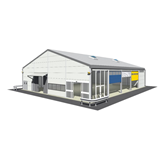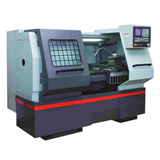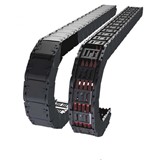Based in Sutton in Ashfield, Lindhurst Engineering was formed in 1985 to provide innovative solutions to the UK mining market — focusing particularly on the operational functionality of coal-face equipment.
However, with the decline of the coal mining industry in the UK, the company realised it needed to look for new markets.
Lindhurst diversified its operations, focusing more specifically on hydraulics. It developed electro-hydraulic motion systems and also worked with Rolls-Royce to upgrade the equipment they used to test the on-board hydraulics of A380 Airbus engines.
Always interested in new ideas, Martin Rigley, the managing director of Lindhurst, had identified there was a significant opportunity in the farming industry to convert waste products into energy.
After attending one of university's Ingenuity events for local businesses, he realised researchers at the university could potentially provide the support necessary to develop his idea.
The university's Environmental Technology Centre (ETC) specialises in helping businesses improve their environmental efficiency, and staff from the ETC met with Martin to explore ways in which the university could help him.
A project was established between Lindhurst and academics at the university, to investigate the potential of developing a new microbial fuel cell (MFC) which could convert farm effluent and dairy by-products into electricity and bio-gas.
As awareness grew of the potential applications of the technology, industrial partners, including Arla Foods, and more recently the anaerobic digestion business, Clearfleau, have also come on board to work with Lindhurst on the project.
"Although scientists have known for almost a century that bacteria produce electric currents, it is only in relatively recent years that we have really started to understand exactly how to harness this power into microbial fuel cells," Keith Baker, director of the university's Environmental Technology Centre, said.
"The microbial fuel cell that the university is developing with Lindhurst will enable farms and other types of agricultural businesses to generate most or all of their energy requirements from wastewater and slurry."
To provide Lindhurst with the dedicated resource needed to commercialise the MFC technology, the university appointed post-doctoral graduate, Laura Porcu, an expert in microbial fuel cell research, into Lindhurst through the Knowledge Transfer Partnership (KTP) scheme.
A Knowledge Transfer Partnership is a relationship between a company and a university, which enables the transfer of knowledge, technology and skills.
Businesses involved in Knowledge Transfer Partnership (KTP) projects experience an average increase in turnover of more than £220,000 per annum.
Porcu's work with Lindhurst is focused on the development and testing of a production-scale fuel cell, based at the university's Sutton Bonington campus, where the waste products from the university dairy farm can be used to fuel the MFC.
Speaking about the collaboration with the university, Martin Rigley said: "The university's support has been invaluable: they came up with the design for the commercial plant and are now developing a working industrial scale prototype.
The results are very promising and we anticipate that within 18 months we will have a product that we can offer to the market.
"My experience of working with the university on this and other projects over the years has been extremely positive, and I would really encourage other businesses that have ideas they want to develop to see how the university might be able to help them too."
Dan King, Head of Knowledge Transfer at The University of Nottingham, added: "The project we are doing with Lindhurst is a great example of how the university can really benefit local businesses.
"Over a number of years we've worked with Lindhurst in a variety of ways with real benefits on both sides. I hope that other local businesses are inspired to make contact, following their example."












